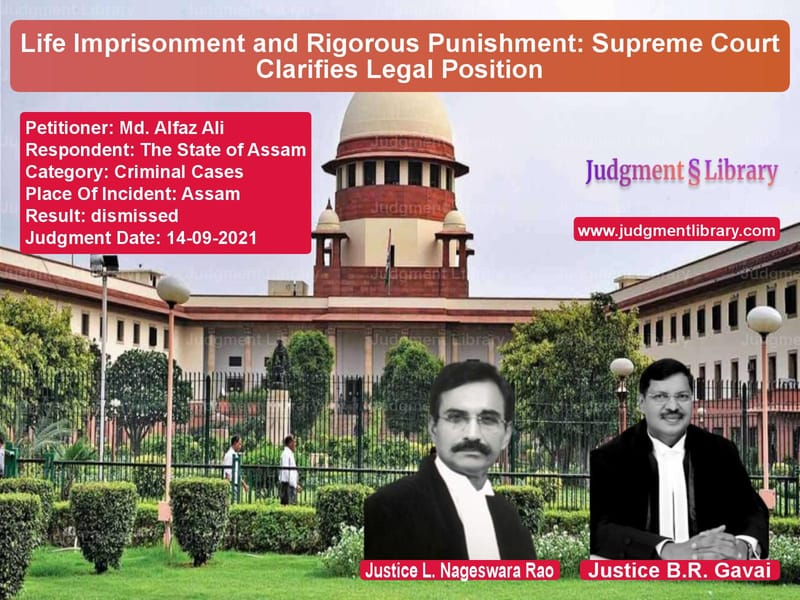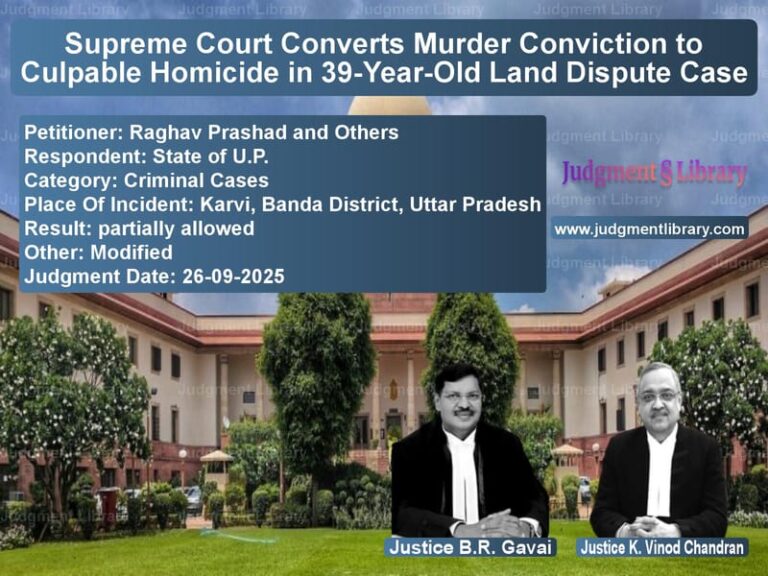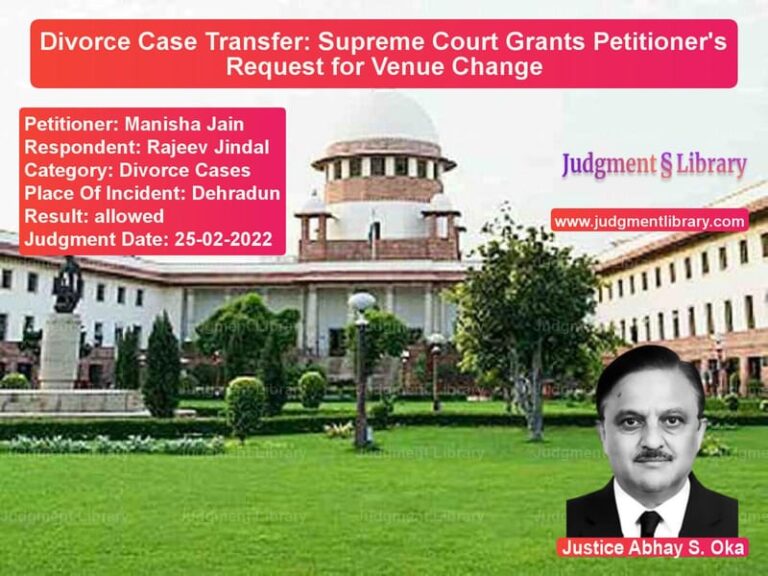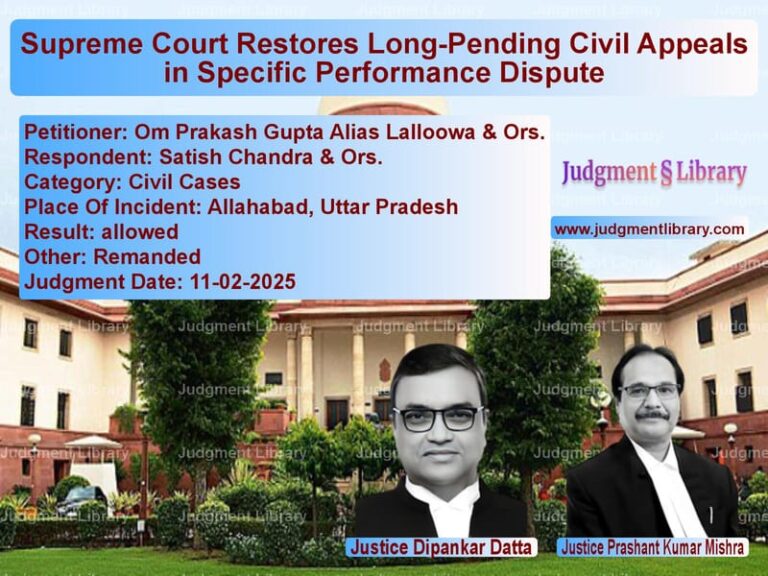Life Imprisonment and Rigorous Punishment: Supreme Court Clarifies Legal Position
In a landmark judgment, the Supreme Court of India in the case of Md. Alfaz Ali vs. The State of Assam reaffirmed that a sentence of life imprisonment under Section 302 of the Indian Penal Code (IPC) is equivalent to rigorous imprisonment. This ruling upholds previous judicial precedents and dismisses any ambiguity regarding the nature of life imprisonment. The case highlights the legal principles governing sentencing under the IPC and addresses the question of whether life imprisonment should always include rigorous imprisonment.
Background of the Case
On October 31, 2006, a complaint was filed by Md. Abdul Jalil, father of the deceased Marzina Begum, alleging that his daughter was murdered by her husband, the petitioner Md. Alfaz Ali. The prosecution contended that the accused killed his wife on the suspicion of infidelity. The trial court found the petitioner guilty under Section 302 IPC and sentenced him to life imprisonment with rigorous imprisonment. The Gauhati High Court, in its judgment dated July 15, 2016, upheld the conviction and sentence.
Aggrieved by the decision, the petitioner filed a Special Leave Petition (SLP) before the Supreme Court, challenging both the conviction and the specification of rigorous imprisonment while imposing a life sentence. The primary issue before the Court was whether a sentence of life imprisonment must necessarily include rigorous imprisonment.
Legal Issues Raised
- Whether life imprisonment under Section 302 IPC should always be equated to rigorous imprisonment.
- Whether the Supreme Court should reconsider its previous rulings on this issue.
- Whether the High Court erred in specifying rigorous imprisonment in the petitioner’s sentence.
- Whether a convict serving life imprisonment should have the option of simple imprisonment.
Petitioner’s Arguments (Md. Alfaz Ali)
The petitioner, represented by senior counsel, argued:
- The judgment in Naib Singh vs. State of Punjab (1983) 2 SCC 454, which held that life imprisonment equates to rigorous imprisonment, required reconsideration.
- Life imprisonment should not automatically be interpreted as rigorous imprisonment unless the court explicitly states so.
- The sentencing provision under Section 302 IPC does not expressly state that life imprisonment must be rigorous.
- Rigorous imprisonment involves hard labor, which should not be imposed unless clearly specified by the trial court.
- The petitioner had already served more than nine years in custody, and the specification of rigorous imprisonment was unwarranted.
Respondent’s Arguments (State of Assam)
The State of Assam, represented by government counsel, countered:
- The Supreme Court had previously ruled in multiple cases that life imprisonment is to be treated as rigorous imprisonment.
- The legal position was settled in Gopal Vinayak Godse vs. State of Maharashtra (1961 3 SCR 440), which held that life imprisonment means rigorous imprisonment.
- Several other Supreme Court judgments, including Sat Pal alias Sadhu vs. State of Haryana (1992) 4 SCC 172, had reaffirmed this principle.
- Allowing convicts to seek a distinction between rigorous and simple imprisonment in life sentences would create legal uncertainty.
- There was no compelling reason to revisit established precedent on this issue.
Supreme Court’s Judgment
The Supreme Court dismissed the petitioner’s appeal, reiterating that life imprisonment under Section 302 IPC necessarily includes rigorous imprisonment. The Court held that there was no ambiguity in the law and that life imprisonment must be interpreted as rigorous imprisonment, in line with established precedents.
“The law laid down in Naib Singh’s case was followed in multiple judgments. There is no need to re-examine this settled legal position.”
“Imprisonment for life, when imposed as a punishment for murder under Section 302 IPC, has always been understood as rigorous imprisonment.”
The Court further stated that unless the legislature amends the law, the judiciary is bound to interpret life imprisonment in the same manner as it has in previous cases.
Key Observations:
- Life imprisonment under Section 302 IPC has consistently been treated as rigorous imprisonment in past judgments.
- The petitioner’s argument that life imprisonment could be interpreted as simple imprisonment was unfounded.
- The courts must adhere to the legislative framework unless an amendment specifies otherwise.
- Allowing a distinction between rigorous and simple imprisonment in life sentences would undermine legal consistency.
Impact of the Judgment
- Reaffirms that life imprisonment under Section 302 IPC automatically includes rigorous imprisonment.
- Ensures consistency in the sentencing framework for murder convictions.
- Discourages unnecessary litigation on settled legal issues.
- Maintains judicial efficiency by upholding long-standing precedents.
Previous Supreme Court Rulings Cited
- Gopal Vinayak Godse vs. State of Maharashtra (1961 3 SCR 440) – Held that life imprisonment is synonymous with rigorous imprisonment.
- Naib Singh vs. State of Punjab (1983) 2 SCC 454 – Confirmed that life imprisonment means rigorous imprisonment.
- Sat Pal alias Sadhu vs. State of Haryana (1992) 4 SCC 172 – Followed the principle established in previous rulings.
- Dilpesh Balchandra Panchal vs. State of Gujarat (1992) 4 SCC 172 – Reaffirmed that life imprisonment should be treated as rigorous imprisonment.
- Mohd. Munna vs. Union of India (2005) 7 SCC 417 – Held that life imprisonment means the convict must remain in prison for life unless granted remission.
Conclusion
The Supreme Court’s ruling in Md. Alfaz Ali vs. The State of Assam upholds a well-established principle in Indian criminal law. By reaffirming that life imprisonment must be treated as rigorous imprisonment, the judgment ensures consistency in the sentencing of convicts under Section 302 IPC. The ruling prevents unnecessary litigation on a settled issue and reinforces that any changes to sentencing policies must come through legislative amendments rather than judicial reinterpretation.
Petitioner Name: Md. Alfaz Ali.Respondent Name: The State of Assam.Judgment By: Justice L. Nageswara Rao, Justice B.R. Gavai.Place Of Incident: Assam.Judgment Date: 14-09-2021.
Don’t miss out on the full details! Download the complete judgment in PDF format below and gain valuable insights instantly!
Download Judgment: md.-alfaz-ali-vs-the-state-of-assam-supreme-court-of-india-judgment-dated-14-09-2021.pdf
Directly Download Judgment: Directly download this Judgment
See all petitions in Murder Cases
See all petitions in Bail and Anticipatory Bail
See all petitions in Custodial Deaths and Police Misconduct
See all petitions in SC/ST Act Case
See all petitions in Judgment by L. Nageswara Rao
See all petitions in Judgment by B R Gavai
See all petitions in dismissed
See all petitions in supreme court of India judgments September 2021
See all petitions in 2021 judgments
See all posts in Criminal Cases Category
See all allowed petitions in Criminal Cases Category
See all Dismissed petitions in Criminal Cases Category
See all partially allowed petitions in Criminal Cases Category







